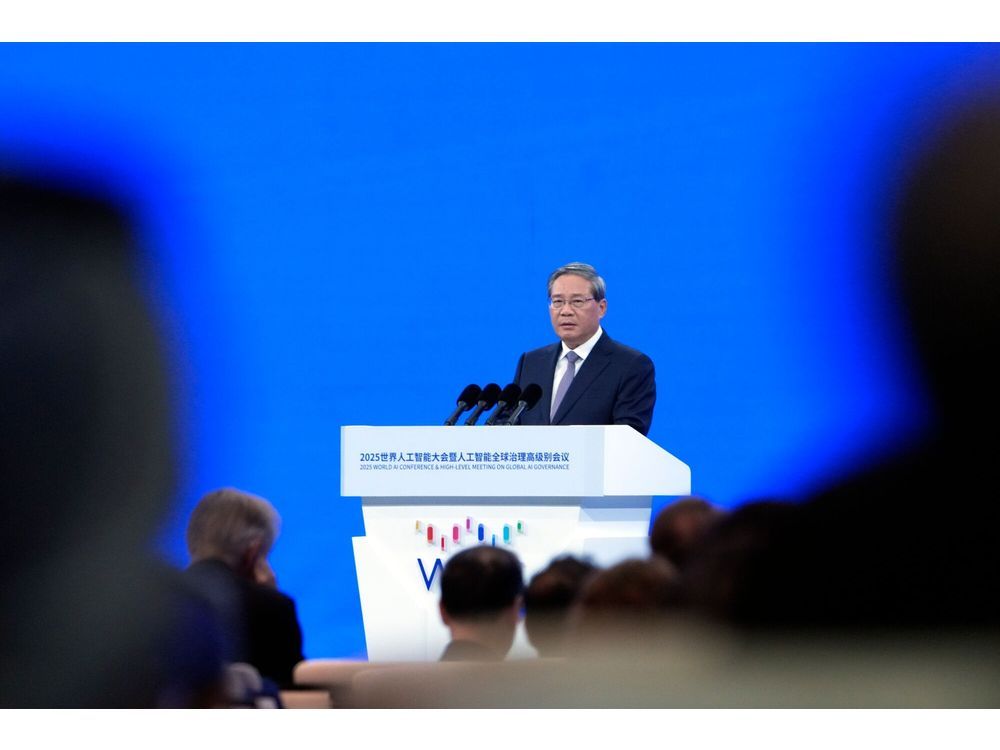Technology
China Proposes Global AI Cooperation Amid US Tech Restrictions

China’s Premier, Li Qiang, announced plans to establish an international organization aimed at collaborative development of artificial intelligence (AI) during the World Artificial Intelligence Conference in Shanghai on March 15, 2024. This initiative seeks to prevent AI technology from being monopolized by a select few nations or corporations, as concerns grow over the potential economic and social implications of AI, including job displacement.
In his address, Li emphasized the need for greater international cooperation, stating that the current concentration of key resources and capabilities in a handful of countries poses a risk of creating a technological monopoly. He remarked, “If we engage in technological monopoly, controls and restrictions, AI will become an exclusive game for a small number of countries and enterprises.” This call for collaboration comes against the backdrop of heightened tensions between China and the United States, particularly related to technology and trade.
The Premier did not specify any countries in his remarks, but it is clear that Chinese officials are responding to recent US actions, including the imposition of restrictions on exports of critical components, such as those from Nvidia Corp., which are essential for AI development. Li acknowledged that semiconductor shortages are a significant hurdle but reiterated the commitment of the Chinese government to advance the country’s technological agenda.
New AI Cooperation Organization
The proposed organization, tentatively called the World AI Cooperation Organization, aims to facilitate the exchange of knowledge and talent among nations. This initiative aligns with President Xi Jinping’s vision for China to enhance its technological capabilities and achieve greater self-reliance amid ongoing global competition.
China and the US are currently engaged in a race to dominate AI technology, which is expected to play a crucial role in shaping future economies and geopolitical dynamics. Recent actions by US President Donald Trump, including executive orders to ease regulations on data centers, underscore the urgency with which the US is pursuing its lead in AI development following the rise of generative AI platforms like ChatGPT.
The ongoing success of Chinese tech companies, exemplified by the rise of DeepSeek, has spurred local startups to ramp up their research and product development. This includes initiatives focused on open-source models and AI agents, showcasing China’s commitment to establishing industry standards and expanding its influence in the global market.
Engaging the Global South
During the conference, Li highlighted China’s intention to support AI development in the Global South, which encompasses nations in regions such as Africa and South America. He stated, “We are willing to share our development experience and technological products to help countries around the world, especially those in the Global South, strengthen their capacity-building and bring the benefit of AI to the world.”
This statement reflects China’s broader strategy to foster international partnerships and enhance its role as a leader in technology. The Shanghai conference, which has featured prominent figures like Geoffrey Hinton and Eric Schmidt in the past, has drawn significant attention this year, with record attendance anticipated due to its timing amid the critical global advancements in AI.
As the conference unfolds, it is positioned as a key platform for discussing the future of AI and the role of collaboration in mitigating risks associated with its rapid growth. The outcomes from this event may shape the trajectory of AI development and international relations in the technology sector for years to come.
-

 Politics4 weeks ago
Politics4 weeks agoSecwepemc First Nation Seeks Aboriginal Title Over Kamloops Area
-

 World5 months ago
World5 months agoScientists Unearth Ancient Antarctic Ice to Unlock Climate Secrets
-

 Entertainment5 months ago
Entertainment5 months agoTrump and McCormick to Announce $70 Billion Energy Investments
-

 Science5 months ago
Science5 months agoFour Astronauts Return to Earth After International Space Station Mission
-

 Lifestyle5 months ago
Lifestyle5 months agoTransLink Launches Food Truck Program to Boost Revenue in Vancouver
-

 Technology3 months ago
Technology3 months agoApple Notes Enhances Functionality with Markdown Support in macOS 26
-

 Lifestyle3 months ago
Lifestyle3 months agoManitoba’s Burger Champion Shines Again Amid Dining Innovations
-

 Top Stories2 months ago
Top Stories2 months agoUrgent Update: Fatal Crash on Highway 99 Claims Life of Pitt Meadows Man
-

 Politics4 months ago
Politics4 months agoUkrainian Tennis Star Elina Svitolina Faces Death Threats Online
-

 Sports5 months ago
Sports5 months agoSearch Underway for Missing Hunter Amid Hokkaido Bear Emergency
-

 Politics5 months ago
Politics5 months agoCarney Engages First Nations Leaders at Development Law Summit
-

 Technology5 months ago
Technology5 months agoFrosthaven Launches Early Access on July 31, 2025





















